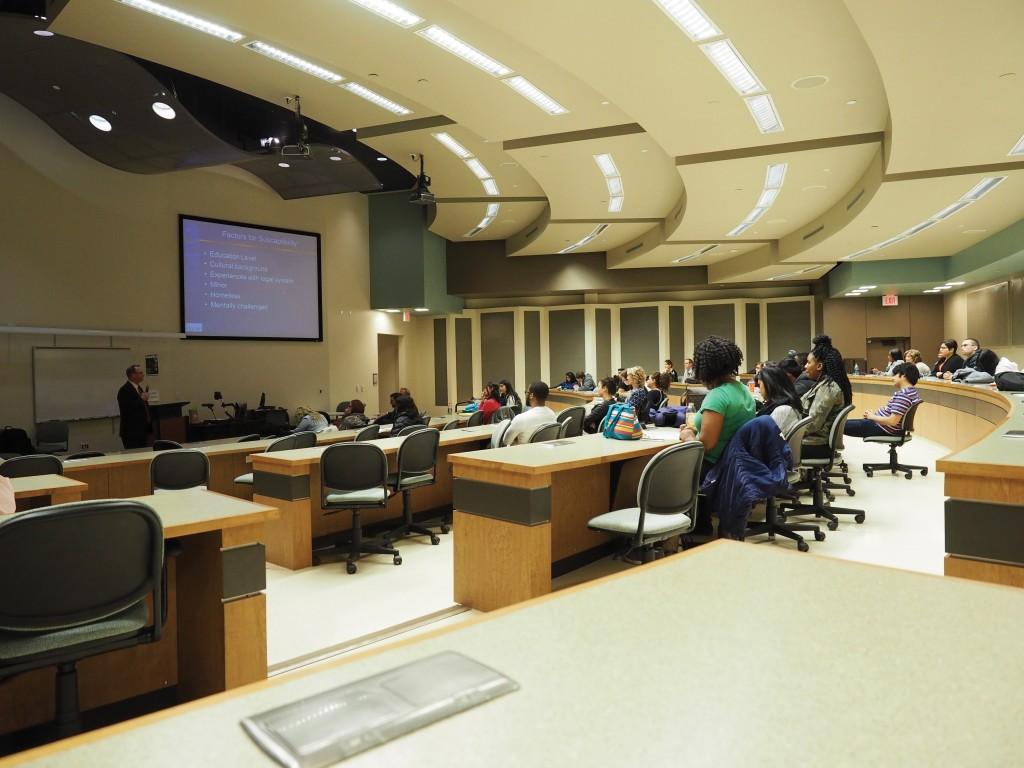
Human trafficking is a $32-billion-a-year industry. It is the third most profitable criminal activity behind drug and arms trafficking, according to the FBI Civil Rights Program.
“Trafficking is not really the best term. It really is slavery,” Ryan Randall, an FBI special agent who spoke at this semester’s second Open Book Project event, said. Randall works with human trafficking cases as part of the FBI’s Civil Rights Program.
The event was held Feb. 25 with a crowd of about 60 students, staff and faculty attending in X1091 lecture hall.
“A lot of times, when people hear ‘trafficking,’ they think that somebody must be moved around across state lines; across international borders,” Randall said.
“[Slavery] is a cheap and disposable commodity,” Randall said.
Today, the average worldwide price to buy another human being is about $90. The same average for the U.S. is about $7,000, he said.
“Back in the transatlantic slave trade days, the estimated cost of a slave – in today’s dollars – was about $40,000,” Randall said. “You had to be a person of means in order to even afford a slave.”
Randall said slavery was abolished in the U.S. by the 13th Amendment. It abolished slavery in the sense that the use of force, beatings and chains to enslave someone became illegal.
“What was not included … was this idea of fraud and coercion – that somebody could be forced to do something through fraudulent means or through some sort of coercion,” Randall said.
The Trafficking Victims Protection Act of 2000 instituted a new kind of definition of human trafficking which includes force, fraud and coercion, Randall said. The three main categories of human trafficking include commercial sex trafficking, labor trafficking and domestic servitude.
Force, fraud or coercion must be proved to bring forth commercial sex trafficking cases involving adult victims, Randall said. That is not the case with minors, as they cannot legally give consent.
Force is the easiest to spot and includes physical abuse or being chained, Randall said. Fraud involves false offers, such as labor or other promises, that induce people into trafficking. Coercion includes threats of harm.
Randall said a common misconception about human trafficking is that only foreigners are involved. He gave an example of a 20-year-old woman who traveled from Oklahoma City to Dallas to work as a stripper.
After being offered $400 for a private dance job, she was kidnapped, raped and drugged.
She escaped after waking from a drug-induced sleep and hearing her captors negotiating her sale to someone in Mexico.
“Dallas has more strip clubs per capita than any other city in the country – they’re all over the place,” Randall said. “Strip clubs are now primarily an advertising vehicle for pimps.”
Another trafficking myth is that it requires foreign or interstate travel, Randall said. In the case of the Oklahoma woman, her captors did not travel outside Dallas city limits.
“It is true that for it to be a federal violation, there has to be a nexus of interstate commerce, but the laws have been interpreted very broadly,” Randall said.
Not all victims of human trafficking are forced into the sex industry, Randall said. Some are coerced into providing labor. This is common with agricultural and migrant workers, as well as foreign workers in Asian restaurants, who are not allowed to leave or may work for little to no pay.
Randall also said trafficking is not smuggling.
“Smuggling is essentially a crime against the border,” he said. “It’s when somebody comes into the U.S. illegally. Generally, it’s at their request – they want to come here.” However, smuggling can become trafficking if the person is detained and forced to work against their will.
Jose Behena, a student, asked how people are coming into the country illegally. “Most of them come over here legally,” Randall said. “They come over either on student visas or work permits, and then once they get here, they either don’t renew, or they renew under some sort of false work permit.”
Randall said certain groups of individuals are more susceptible to falling victim to human traffickers. These groups include minors, runaways, the under-educated, the homeless, the mentally ill or impaired, and those with conservative or exclusionary backgrounds.
Immigrant populations from China, Korea, Guatemala and Russia tend to cluster in groups and not allow others in, Randall said. They are trained to believe local law enforcement is the enemy.
Randall said trafficked Asian workers in massage parlors are made to believe their way of life in the U.S. is acceptable. When found, they tell authorities they are doing what they like to do.
“The biggest challenge that I have is the fact that most times, victims don’t identify as victims,” Randall said. “And if I can never get them to identify as a victim, it’s almost impossible to prosecute the trafficker.”
Adelfo Ismael Lopez, a student, asked why Dallas is so appealing for human trafficking.
Randall said any large city is going to have a lot of trafficking, but Dallas and other large Texas cities are more susceptible because of the freeway system. He said the state’s location is also ideal for traffickers to disperse their victims throughout the country.






